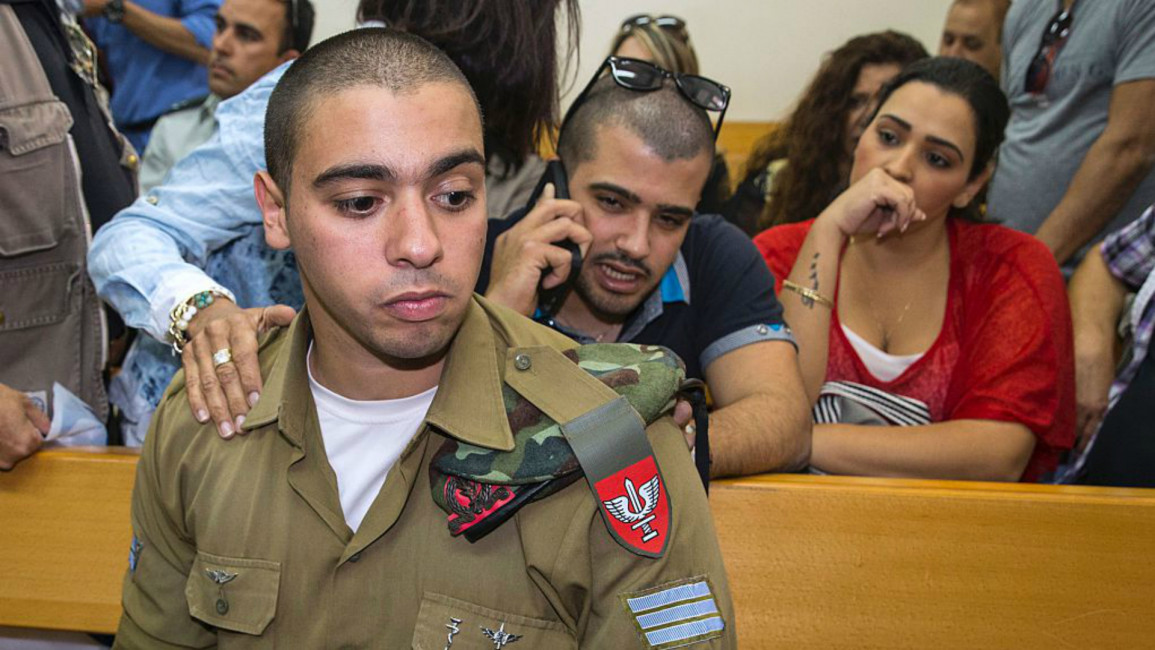Sentencing hearing for Israel soldier convicted of manslaughter
Sentencing hearing for Israel soldier convicted of manslaughter
A sentencing hearing began on Tuesday for an Israeli soldier convicted of manslaughter for shooting dead a prone Palestinian assailant.
2 min read
Netanyahu has called for Azaria to be pardoned [Getty]
A sentencing hearing began on Tuesday for an Israeli soldier convicted of manslaughter for shooting dead a prone Palestinian assailant, in a case that has deeply divided the country.
French-Israeli Sergeant Elor Azaria, 20, arrived at the military court in Israel's defence headquarters smiling and was applauded by his family, with his mother taking him in her arms.
Azaria is not expected to be sentenced in Tuesday's hearing, though prosecutors may be given the opportunity to request what his prison term should be.
The hearing began with procedural arguments.
Azaria faces up to 20 years in prison, though there have been reports that prosecutors will recommend between three and five years.
His case has sparked political tensions.
Prime Minister Binyamin Netanyahu, who heads what is seen as the most right-wing government in Israeli history, has called for him to be pardoned.
Right-wing ministers have defended Azaria despite top army brass condemning his actions in an extraordinary public rift between politicians and the military.
The March 24 shooting in the occupied West Bank city of Hebron was caught on video and spread widely online.
It showed Abdul Fatah al-Sharif, 21, lying on the ground, shot along with another Palestinian after stabbing and wounding a soldier, according to the Israeli army.
Azaria then shoots him again in the head without any apparent provocation.
Convicting him of manslaughter on January 4 after a months-long trial, a three-judge panel ruled there was no reason for Azaria to open fire since the Palestinian was posing no threat.
Judge Colonel Maya Heller called his testimony "evolving and evasive".
"His motive for shooting was that he felt the terrorist deserved to die," she said.
When the verdict was announced, dozens of Azaria supporters scuffled with police outside military headquarters in Tel Aviv.
Arrests were also made in the days afterwards following threats against the judges, prosecution and the army chief of staff.
As the hearing began on Tuesday, around 50 protesters gathered outside with a sign saying "the people support and salute the hero, soldier Elor Azaria." They were surrounded by around 60 police officers and there was no violence.
French-Israeli Sergeant Elor Azaria, 20, arrived at the military court in Israel's defence headquarters smiling and was applauded by his family, with his mother taking him in her arms.
Azaria is not expected to be sentenced in Tuesday's hearing, though prosecutors may be given the opportunity to request what his prison term should be.
The hearing began with procedural arguments.
Azaria faces up to 20 years in prison, though there have been reports that prosecutors will recommend between three and five years.
His case has sparked political tensions.
Prime Minister Binyamin Netanyahu, who heads what is seen as the most right-wing government in Israeli history, has called for him to be pardoned.
Right-wing ministers have defended Azaria despite top army brass condemning his actions in an extraordinary public rift between politicians and the military.
The March 24 shooting in the occupied West Bank city of Hebron was caught on video and spread widely online.
It showed Abdul Fatah al-Sharif, 21, lying on the ground, shot along with another Palestinian after stabbing and wounding a soldier, according to the Israeli army.
Azaria then shoots him again in the head without any apparent provocation.
Convicting him of manslaughter on January 4 after a months-long trial, a three-judge panel ruled there was no reason for Azaria to open fire since the Palestinian was posing no threat.
Judge Colonel Maya Heller called his testimony "evolving and evasive".
"His motive for shooting was that he felt the terrorist deserved to die," she said.
When the verdict was announced, dozens of Azaria supporters scuffled with police outside military headquarters in Tel Aviv.
Arrests were also made in the days afterwards following threats against the judges, prosecution and the army chief of staff.
As the hearing began on Tuesday, around 50 protesters gathered outside with a sign saying "the people support and salute the hero, soldier Elor Azaria." They were surrounded by around 60 police officers and there was no violence.



